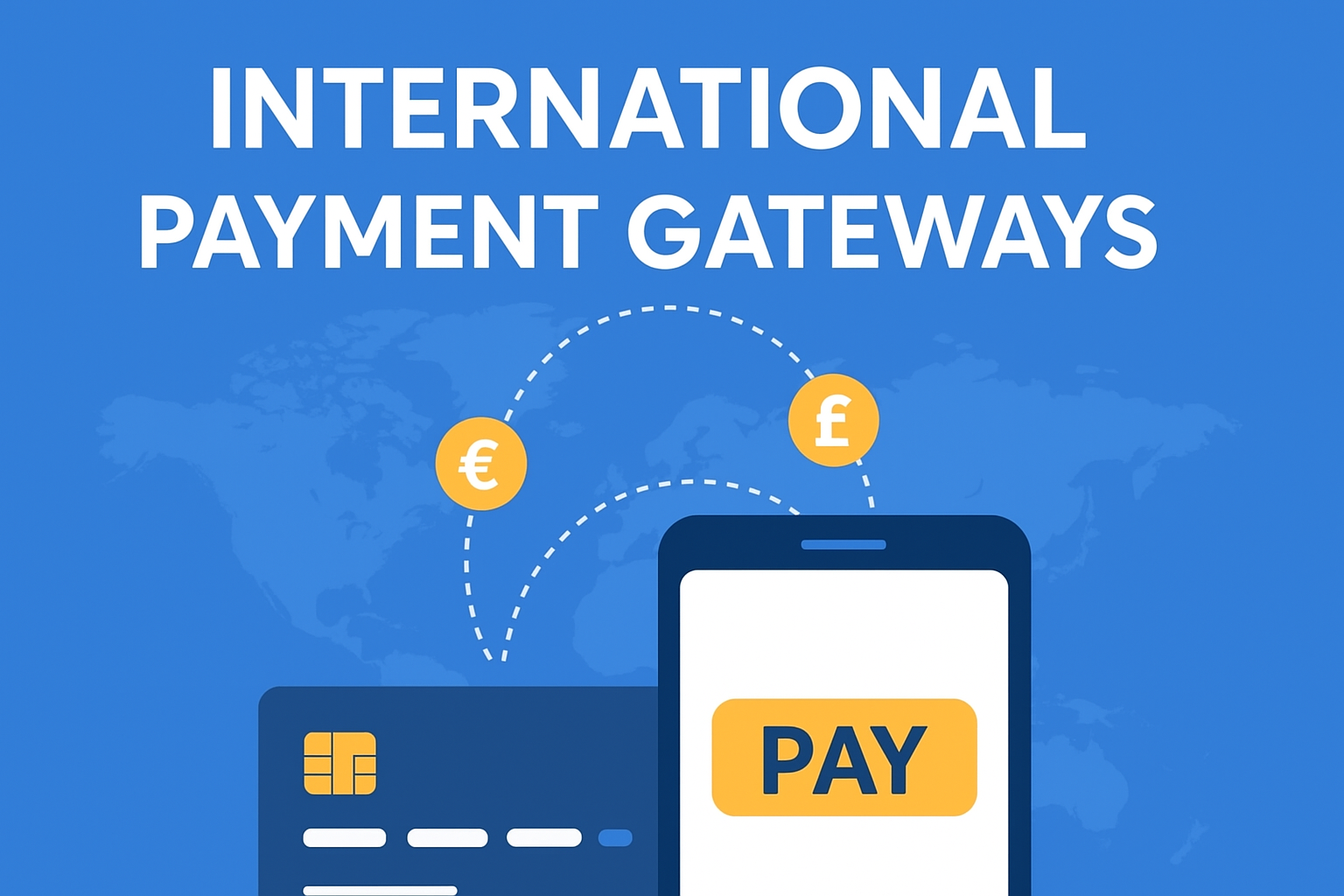Pick the Right Payment Gateway for International Transactions: Complete Guide 2025
4 Min
October 29, 2025
Author:
Garry


In today’s global ecommerce and B2B landscape, choosing the right Payment Gateway for International Transactions is not just a technical step, it’s a strategic business decision. For companies engaging in international payments, your gateway directly impacts conversion rates, compliance, and operational costs.
Every time you accept a payment from a customer in another country, some things come into play: currencies, exchange rates, local payment methods, fraud risk, and compliance. If your gateway doesn’t handle these well, you may see higher decline rates, frustrated business buyers, hidden fees, and unnecessary complications.
Top 5 Payment Gateways For International Transactions
Below, we have listed the top 5 gateways that you should consider when your business operates internationally.
1. PayFirmly
PayFirmly is a modern payment orchestration platform that supports a very wide range of payment methods, currencies, and global markets. According to its website, it supports 500+ payment methods (cards, bank transfers, wallets, crypto) and is built to handle cross-border/business-global transactions.
From a B2B international perspective, PayFirmly stands out because:
- Its intelligent routing chooses the best payment service provider (PSP) for each transaction, which can increase approval rates and reduce decline losses.
- Multi-currency and local payment method support means you can accept payments where your clients operate, not just from one default region.
- Strong fraud prevention and global compliance (PCI DSS Level 1, GDPR, etc.) reduce risk when operating in higher-risk international segments.
- Flexibility, no vendor lock-in, you can integrate many PSPs and payment methods as you scale.
For a B2B firm with international clients and cross-border payments, PayFirmly offers a very compelling option. Especially if you expect to scale, need many payment methods, and want to simplify global coverage.
2. Stripe
Stripe is extremely popular globally and supports many countries and payment methods. For example, it supports over 195 countries and handles over 135 currencies in its cross-border offering.
For international transactions:
- Smooth and developer-friendly integrations
- Good choice for medium to large firms expanding globally
- For B2B, if you need recurring billing, platform payments, etc., Stripe fits well
Limitations: There might still be local acquiring or local payment method integration needed in some areas that would not be covered by the default solutions offered by Stripe.
3. PayPal
PayPal has a global payment platform with wide coverage. It is available in over 200 countries and regions, supporting 25 currencies.
For B2B:
- Trusted brand, which may help with global buyers
- Works especially well if your business model already interacts with PayPal users
But for purely B2B high-volume international transactions, you’ll want to check enterprise features (fees, settlement, local acquiring) carefully.
4. Adyen
Ayden is a well-known global payment platform offering global payment processing designed for your business.
- Local acquiring in many countries, which helps increase approval rates by using local acquiring banks.
- Adyen supports multi-currency settlement and wide global coverage. It is also good for businesses looking at serious global expansion with uniform infrastructure.
For B2B: If you own offices, operations, or clients in many geographies, Adyen provides a strong platform, through perhaps at a higher cost and with more complexity.
5. Braintree
Braintree offers global payments, including cards, digital wallets, and local methods. It supports businesses in over 40 countries and processes payments in more than 130 currencies.
For B2B cross-border:
- Owned by PayPal, strong brand reputation
- Good for firms that already use the PayPal ecosystem
- Offers tools for managing fraud, recurring billing, and multiple payment methods
Make sure to look for coverage in the currency, other means of payment in that area, and the cross-border pricing in a B2B scenario.
Why is Picking the Right Payment Gateway Important?
From a B2B view, why does choosing the right payment gateway decision really matter? Below are the reasons:
- Revenue & Approval Rates
When you sell internationally, the payment gateway influences whether you’ll get payment approved or declined. Local acquiring, local payment methods, and smart routing all boost conversion. A poor choice means higher declines, lost deals, and frustrated clients.
- Cost / Fee Structures
International transactions come with a lot of extra costs: currency conversion, cross-border fees, and finally, the time taken for settlement, among others. However, one could avoid these costs by selecting the appropriate gateway. PayFirmly, for example, asserts that their intelligent routing can result in even 30% cost reduction. If, however, you do not verify the gateway's undisclosed charges, you could find yourself paying a very high acceptance cost.
- Client Experience / Trust
Business clients expect smooth, seamless payment experiences. If they reach checkout, see limited payment methods (their local wallet), or get an unexpected conversion cost, they might drop off or choose a competitor. Your gateway can help you meet local buyer expectations (local currency, local method).
- Compliance & Risk Management
International B2B transactions involve regulations (currency controls, KYC, fraud, chargebacks). A gateway that handles global risk, fraud prevention, and supports local requirements helps you avoid surprises. PayFirmly emphasises built-in fraud/risk controls.
- Scalability & Future Markets
Choosing a gateway that supports future expansion (new geographies, new currency flows, new payment methods) means less disruption later. If you pick a gateway only suited for your current country, you may need to migrate later a costly exercise.
Step-by-Step Guide to Choosing the Right Gateway for International Transactions
Here’s how a B2B company should approach the decision.
- Define Your International Payment Needs
Identify the countries and regions you currently serve or plan to target. Determine the currencies and payment methods your clients prefer. Understand transaction volumes, recurring payment needs, and buyer habits to ensure your gateway supports the right payment experiences globally.
- Evaluate Gateway Capabilities
Review each gateway’s ability to handle multi-currency payments, local payment options, and smart cross-border routing. PayFirmly’s intelligent routing, for example, improves approval rates and reduces costs. Also, check integration simplicity, fraud protection, reporting tools, and reliable customer support across regions.
- Compare Pricing and Cost-Effectiveness
Conduct a thorough analysis of all cost factors, including the fees for transactions, conversions, and settlements. Create projections of possible costs that are determined by your volumes and countries. Do not forget that better approval rates sometimes are more advantageous than the slightly higher fees. PayFirmly supports companies in reducing their expenses by up to 30% with its efficient transaction routing.
- Conduct a Technical and Operational Assessment
Ensure the gateway integrates seamlessly with your ERP, CRM, and invoicing systems. Check compliance with KYC and AML standards. PayFirmly supports even high-risk industries, offering global uptime, responsive support, and smooth user experiences across currencies and languages.
- Pilot, Test, and Plan for Growth
Begin with a limited pilot to evaluate the acceptance rates, the duration of settlement, and the customers' reaction. Monitor the main indicators to reveal the advantages and the weaknesses. Go for a versatile gateway like PayFirmly that effortlessly grows with the advent of new markets and changes in the payment trends.
- Make a Decision and Implement
Once you have done the analysis, it is time to make the choice for the payment gateway that will suit your financial, operational, and compliance objectives the most. Negotiate well the contract terms, make the integration smooth, and run a thorough testing. Never stop monitoring the performance to confirm that the gateway is there to help your business grow worldwide.
Conclusion
For B2B companies looking to expand globally, choosing the right payment gateway is crucial for revenue, efficiency, and customer trust. The best gateway supports multiple currencies, allows smooth cross-border transactions, and meets compliance standards. PayFirmly offers intelligent routing, multi-currency support, and a wide range of payment methods. This helps businesses reduce costs and improve approval rates.
While other options like Adyen, Stripe, and Braintree also provide good services, PayFirmly stands out with its flexibility for global growth. By assessing your needs, testing performance, and comparing costs, you can choose a gateway that ensures smooth international operations and helps your business succe
Secure Crypto Payment Orchestration & Processor with PayFirmly
The future of adult payment processing is intelligent, compliant, and built around you.
Join leading adult brands using PayFirmly to boost approvals, cut fees, and simplify multi-processor management — all from one secure dashboard.






